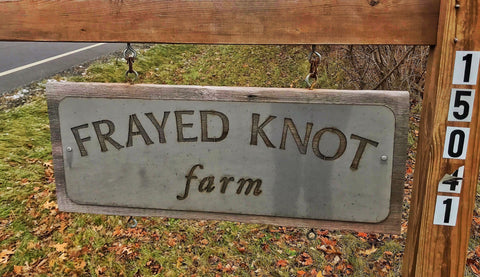Frayed Knot Farm: Regenerative Flower Farming
Buying a bouquet of flowers has implications far beyond making a positive impact on someone’s day. Flowers are also at the core of a chemical-laden import industry that leads to ill-effects for both the environment and the people who work with them. These are insights that Frayed Knot Farm owner and operator Emily Pek wants her community to be aware of. As a local and in season flower grower, Emily seeks to foster resilient plants, soil, and community using natural, collaborative, and regenerative methods.

Located in Newbury, Ohio with just under an acre in active production, Frayed Knot Farm grows cut flowers, hanging baskets, seedlings, herbs, and vegetables. Emily’s farm is also home to a joint project with the Rust Belt Fibershed, shared cooler and pick-up access for other local growers, The Collab, designates areas strictly for pollinators, harvests rainwater, and is a venue for workshops that encourage creativity and connection with nature. If it isn’t obvious yet, we’ll state it, this lady cares deeply for the earth and her impact on it.

Emily utilizes compost, avoids synthetic pesticides and preservatives, and believes that as global warming disrupts our weather patterns, regional producers become increasingly more valuable and sought-after. This is why she is dedicating herself to full time ++ to develop her flower farm for the coming years.

In order to increase the resiliency of her farm, she starts with quality materials. All of her seedlings are grown in locally produced and compost-based, Sprout. seed starting mix from Tilth Soil. For a farm that is dependent upon rainwater collection, the water-holding capacity of Sprout is significantly better than the peat-based formulations she has used in the past.

She then transplants those seedlings into beds amended with local Wendell compost, made from landfill-diverted food scraps. The compost is also fine enough for her to direct-seed into as well. Throughout the season she responds to plant needs with natural amendments, but avoids tilling, and mulches extensively to keep the weeds down.

When it comes to the flowers themselves, she does not spray because she doesn’t want her, the folks who work on her farm, or customers to come into contact with anything harmful (Pesticides and Cut Flowers (nwf.org)). Additionally she appreciates and wants to encourage others to appreciate the entire essence of a flower; its beauty lies in its death. Flowers are only in bloom for a short time. Local flowers are different from imported, preservative-soaked, flowers because they require engagement. Engagement in the form of daily observation, a water change here and there, and a rearrangement of the most focal blooms each day.

This does not mean regional cut flowers are less than their imported counterparts, it simply means that they are a different product entirely, and should be cared for differently. In season flowers are beautiful because they can not be replicated, are indicative of the time of year, and fully represent the cycle of life and death.
For those growing cut flowers at home, Emily notes that it’s important to harvest flowers before they are fully open. This allows them to unfurl over a few days and extends their vase life. She also cautions to not get too excited about purchasing every variety in a seed catalog. Select a few, seed swap with others, and don’t overdo it. In case you don’t grow at home you can purchase Frayed Knot Farm’s CSA of weekly bouquets July through September.
For more information, visit www.frayedknotfarm.com, as well as on Instagram and Facebook.

I’m right around the corner from Frayed Knot, now I’m going to go visit and learn!